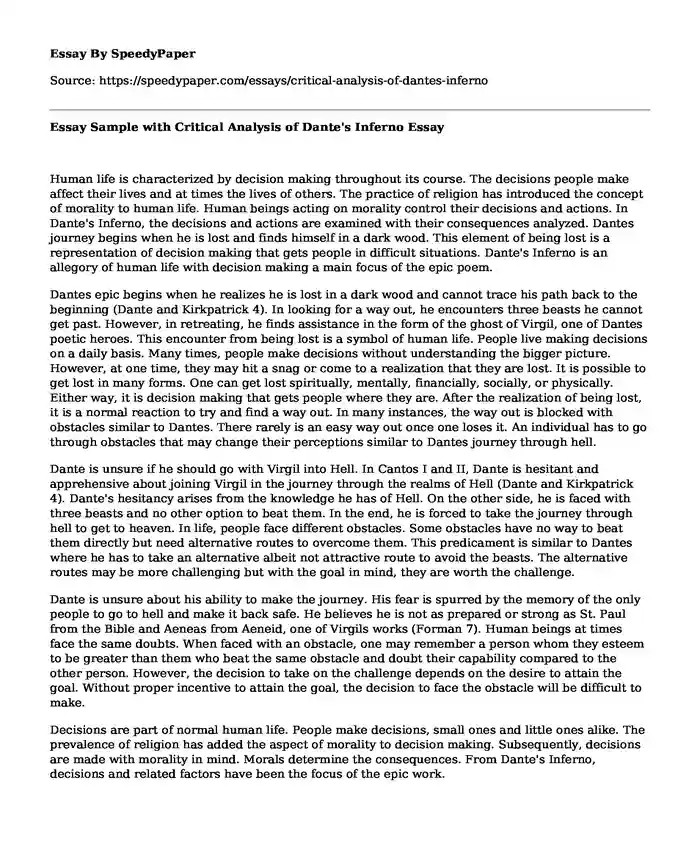
| Type of paper: | Essay |
| Categories: | World literature |
| Pages: | 3 |
| Wordcount: | 656 words |
Human life is characterized by decision making throughout its course. The decisions people make affect their lives and at times the lives of others. The practice of religion has introduced the concept of morality to human life. Human beings acting on morality control their decisions and actions. In Dante's Inferno, the decisions and actions are examined with their consequences analyzed. Dantes journey begins when he is lost and finds himself in a dark wood. This element of being lost is a representation of decision making that gets people in difficult situations. Dante's Inferno is an allegory of human life with decision making a main focus of the epic poem.
Dantes epic begins when he realizes he is lost in a dark wood and cannot trace his path back to the beginning (Dante and Kirkpatrick 4). In looking for a way out, he encounters three beasts he cannot get past. However, in retreating, he finds assistance in the form of the ghost of Virgil, one of Dantes poetic heroes. This encounter from being lost is a symbol of human life. People live making decisions on a daily basis. Many times, people make decisions without understanding the bigger picture. However, at one time, they may hit a snag or come to a realization that they are lost. It is possible to get lost in many forms. One can get lost spiritually, mentally, financially, socially, or physically. Either way, it is decision making that gets people where they are. After the realization of being lost, it is a normal reaction to try and find a way out. In many instances, the way out is blocked with obstacles similar to Dantes. There rarely is an easy way out once one loses it. An individual has to go through obstacles that may change their perceptions similar to Dantes journey through hell.
Dante is unsure if he should go with Virgil into Hell. In Cantos I and II, Dante is hesitant and apprehensive about joining Virgil in the journey through the realms of Hell (Dante and Kirkpatrick 4). Dante's hesitancy arises from the knowledge he has of Hell. On the other side, he is faced with three beasts and no other option to beat them. In the end, he is forced to take the journey through hell to get to heaven. In life, people face different obstacles. Some obstacles have no way to beat them directly but need alternative routes to overcome them. This predicament is similar to Dantes where he has to take an alternative albeit not attractive route to avoid the beasts. The alternative routes may be more challenging but with the goal in mind, they are worth the challenge.
Dante is unsure about his ability to make the journey. His fear is spurred by the memory of the only people to go to hell and make it back safe. He believes he is not as prepared or strong as St. Paul from the Bible and Aeneas from Aeneid, one of Virgils works (Forman 7). Human beings at times face the same doubts. When faced with an obstacle, one may remember a person whom they esteem to be greater than them who beat the same obstacle and doubt their capability compared to the other person. However, the decision to take on the challenge depends on the desire to attain the goal. Without proper incentive to attain the goal, the decision to face the obstacle will be difficult to make.
Decisions are part of normal human life. People make decisions, small ones and little ones alike. The prevalence of religion has added the aspect of morality to decision making. Subsequently, decisions are made with morality in mind. Morals determine the consequences. From Dante's Inferno, decisions and related factors have been the focus of the epic work.
Works Cited
Dante, Alighieri, and Robin Kirkpatrick. The Divine Comedy: 1. London: Penguin, 2006. Print.
Forman, Carol. Dante Alighieri's Divine Comedy, the Inferno. Woodbury: Barrons Educational Series, 1984. Print.
Cite this page
Essay Sample with Critical Analysis of Dante's Inferno. (2019, Jun 26). Retrieved from https://speedypaper.com/essays/critical-analysis-of-dantes-inferno
Request Removal
If you are the original author of this essay and no longer wish to have it published on the SpeedyPaper website, please click below to request its removal:
- International Students in the United States - Check This Free Essay to Learn More
- Case Analysis Example: OSG Corporation
- Oil Companies Research in Our Free Essay Sample
- Free Essay Highlighting the Effects of Transportation Industry on the Environment
- Is It Better to Gain U.S. Citizenship? Free Essay Sample
- Free Essay Example. Sources of Motivation
- Free Essay on Speech Topic: Incorporating SBAR tools in hospital communication.
Popular categories




